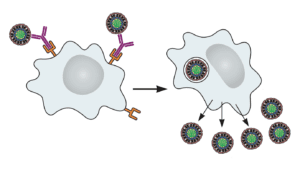

A study of 8002 children, ages 2-14, in Nicaragua was designed to examine the relationship between antibodies that bind dengue virus and disease severity. The concentration of antibodies against the four dengue virus serotypes was determined in 41,302 serum samples taken from 2004-2016. Antibody titers were then correlated with disease severity.
The results are very clear: the hazard of acquiring DHF/DSS is 7.64-fold higher in children with dengue antibody levels from 1:21 to 1:80, compared with low or high levels. (The numbers refer to the highest serum dilution which reacts with dengue viral antigens). Put simply: DHV/DSS is not associated with high or low antibody titers against the virus, but rather an intermediate level.
The study also found that the half life of dengue virus antibodies is 4 years. This observation means that children who have a high level of dengue virus antibodies, and are protected from serious disease, will eventually become susceptible as their serum titers decline.
The results of this study show that DHF/DSS is caused by a specific level of antibodies to dengue virus (1:21 to 1:80), while protection against infection requires higher antibody titers (over 1:320). This difference has not been taken into account in the development of dengue virus vaccines. A vaccine that induces intermediate levels of antibodies may place individuals at greater risk for severe disease. This situation may be the case with Dengvaxia, as we discussed recently.
Why intermediate levels of antibodies causeo DHF/DSS is not known. The model for dengue ADE proposes that non-neutralizing antibodies bind virus and allow uptake into immune cells bearing Fc receptors (illustrated). Infection of these cells is followed by vascular leakage and severe dengue disease. The results of one study show that antibodies from patients with DHF/DSS bind with higher affinity to a specific Fc receptor, compared with antibodies from control patients. The increased affinity of these antibodies for Fc receptors is a consequence of the lack of the sugar fucose on this part of the antibody molecule. Amazingly, dengue virus infection triggers the production of antibodies with higher affinity for Fc receptors.
It is likely that other mechanisms contribute to the development of severe dengue virus disease, including T cell responses to infection. A comprehensive study of innate, cellular, and antibody responses to infection and disease will be needed to fully understand DHF/DSS and to produce safe dengue virus vaccines.

Pingback: Antibodies mediate severe dengue in humans - VETMEDICS
Pingback: Antibodies mediate severe dengue in humans - Virology